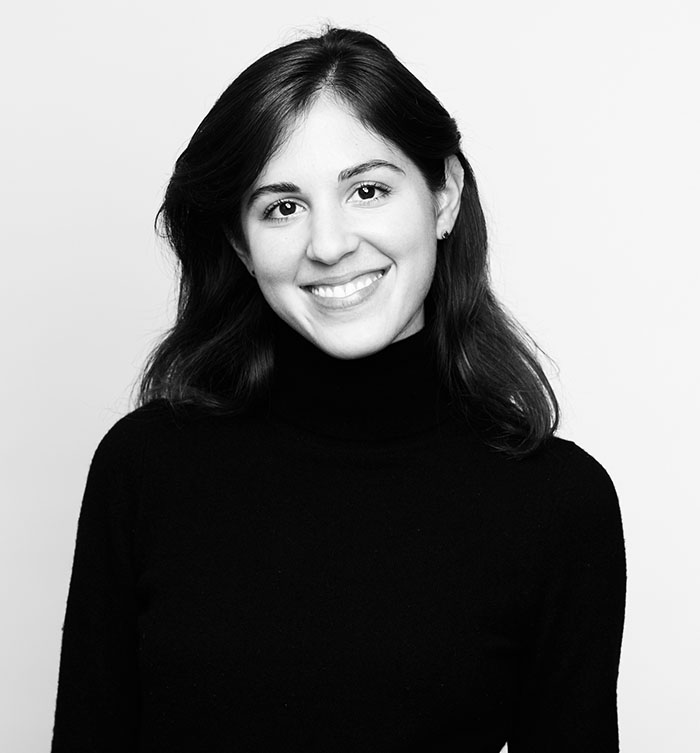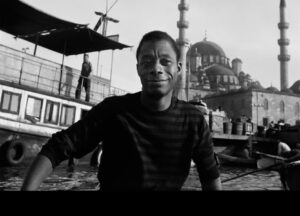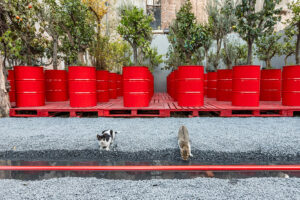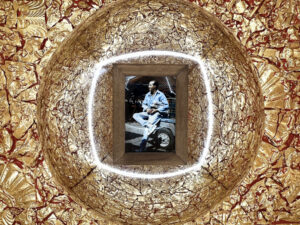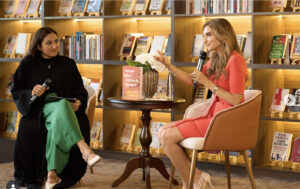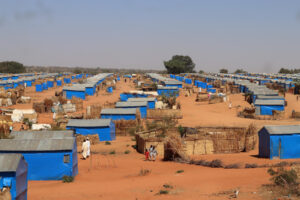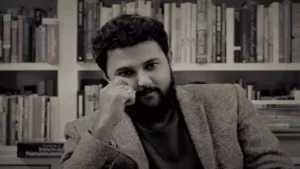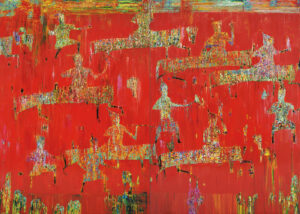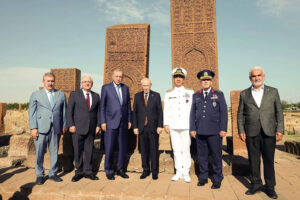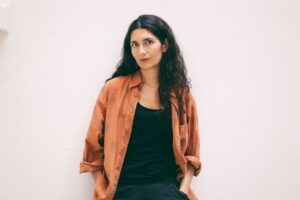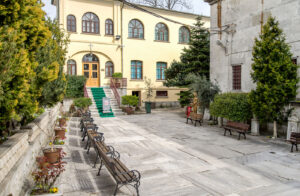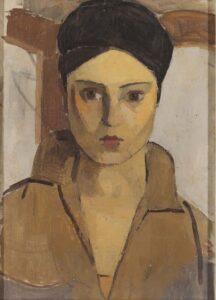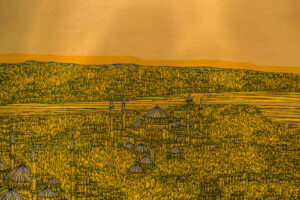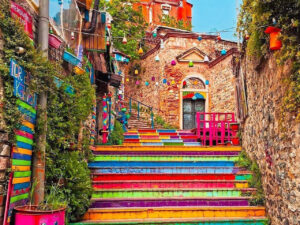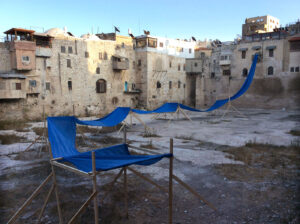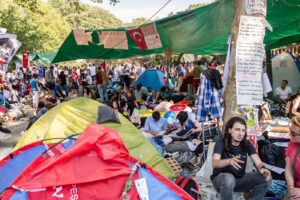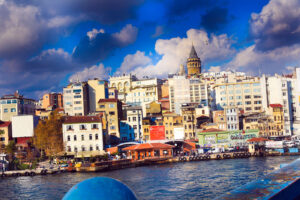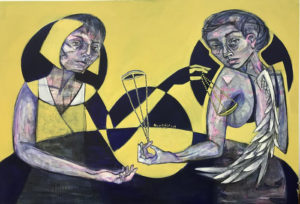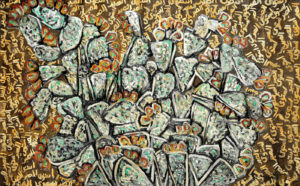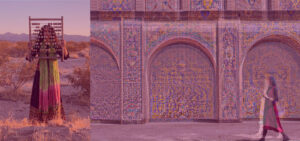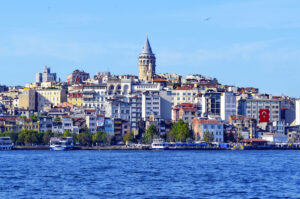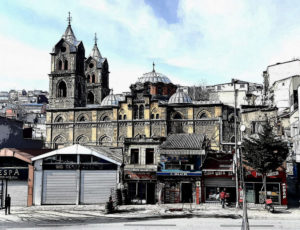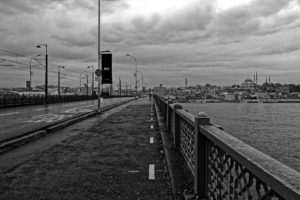Aysegül Savas’ The Anthropologists tells the story of Asya and Manu, a young couple who leave their respective home countries to build a life together in an unnamed new country. The world is their oyster as they observe the locals and begin to build a bespoke culture between themselves.
The Anthropologists, a novel by Ayşegül Savaş
Bloomsbury Press, 2024
ISBN 9781639733064
Amy Omar
There is a beauty to highlighting the mundane that feels emotionally evocative. Perhaps I felt so drawn to Ayşegül Savaş’ upcoming novel, The Anthropologists because it catches me in a similar stage of my life. Like Asya and Manu, I too am part of a relationship where we come from different cities and have decided to live in a place not our cultural homes. When you make these sorts of decisions, there is no longer a rulebook. There are no mother-in-laws running down the street to bake with on the weekends. No religious gatherings. No one to monitor your consumption of vices. You are free to live the life you want. Irrespective of the freedom, as humans, we gravitate to routine, to ritual. These rituals, whether chosen or passed down, ground us with a sense of purpose.
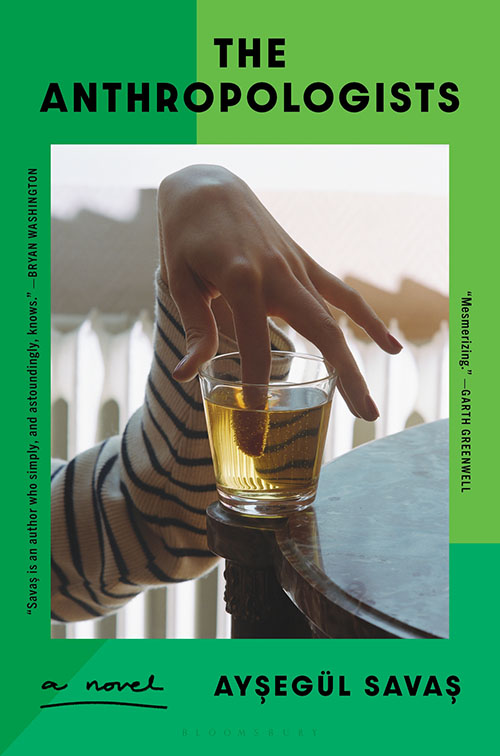
Savaş is known for her “quiet” style of writing often set around an observant protagonist, as exhibited in her short stories and previous novels, Walking on the Ceiling (2019) and White on White (2021). In line with her first two novels, The Anthropologists brings us back into her world of voyeurs. We are introduced to Asya and Manu — a young married couple living in a city foreign to them both — as they attempt to make roots. Set in an unnamed city with culturally undefined characters, Aysa observes the rituals around her, curious and open to the seemingly endless possibilities of defining her and Manu’s lives.
Savaş is a woman of the world; originally from Turkey, she has lived in many lands. Paris, where she currently resides is the longest place she has lived and now calls home. Over Zoom, from our chosen homes (I from New York and she from Paris), we spoke about giving importance to the seemingly banal, La Nouvelle Vague in cinema and capturing the transitory phases of life. The Anthropologists was released by Bloomsbury Press on July 9, 2024. This interview has been edited for length and clarity.
AO: Your third novel The Anthropologists follows on your first child’s birth. Did you question your work in relation to becoming a mother?
AS: I didn’t ever question why I was writing, but I did ask myself when I was editing The Anthropologists, how I could relate to these characters who are smoking and having these lengthy discussions. I asked myself who wrote this? Who even has time for any of that? The positive is that now I have much more clarity on what my priorities are — I only want to write full time and it was a nice clarification for me that this is all I want to do with the little time that I have.
AO: In a way, you are living the future version of the characters in The Anthropologists.
AS: I think this is true for many writers, that their characters grow up, but they’re always lagging in some years. In Walking on the Ceiling, I wrote about a character in her early 20s, and I was in my late 20s. In White on White, I wrote about a graduate student, and now I’m writing about a postgraduate student. Probably next I’ll be writing about someone in their late 30s.
AO: The Anthropologists originated from a short story published in the New Yorker in 2021, “Future Selves,” but how did you get the initial idea for the story and then why did you decide to expand it into a novel?
AS: I wrote the short story really rapidly, which isn’t true for my writing in general. I typically write very slowly. There was such a clear moral orientation that I knew exactly where I was going. I wanted to explore that feeling of one’s own life going so well but then living alongside tragedy. This sounds like a cliché, but I wrote it in one sitting. I had that feeling of having a direction that was so strong, I thought why not?
As I started expanding “Future Selves” into The Anthropologists, I had so much more to say on the theme of how does one make a life as a foreigner. I used the character’s hunt for an apartment as a skeleton for containing and exploring that topic.
In the story, and then in my own life as well, I was feeling this yearning for a very near past of being young and not having responsibilities, but also being an adult. Now you can pay your own rent, and you know what your career is, and you don’t have children and you’re not paying a mortgage. Maybe you have a few friends that are up for spontaneously hanging out and you all know that this will last for only a short period of time. That’s when I knew I wanted to write that novel.
AO: On the theme of making a life as foreigner, you are Turkish and have lived in many places. How long have you been in Paris?
AS: I’ve lived in Paris for twelve years, the longest I’ve ever lived anywhere. I lived in California previously and when my husband, who is a researcher, had a job offer in Paris, we figured we both speak French so we decided to move. It was closer to both of our home countries without being in our home countries. I do feel a love for the city and while I feel like it’s my home, I still feel like a foreigner. But you know, if I moved back to Istanbul, it would feel foreign as well. It’s that sense of feeling mostly at home in many places, but not entirely at home.
The Anthropologists is very autobiographical, because I always grew up in different places. I’m married to a Latvian and though this is my partner in life, we also know that we’ll never really fit into one another’s native countries. There’s that anxiety of wanting to create something that feels meaningful and have that meaning not be something imposed on us. For example, here’s a holiday we have to celebrate because our families celebrate it. Instead we want something authentic and important to us.
I also have an anthropology background, so innately I have this lens of looking at life and habits like an ethnographer. I give importance to these very small aspects of daily life. What specific values and rituals bring people together in a foreign place so that you’re not a floating, cultureless being?
When I was writing this novel, I would ask people what are your rituals in life, what are the things that give meaning? Many of our friends are secular, global citizens, and would initially say they have no rituals. But then, they would bring up things like Friday night pizza or when any of our writer friends gets a story published, we go out to celebrate at this restaurant. These are all actual rituals. This is how one creates a culture.
AO: Has living in Paris influenced your writing? I know your first novel, Walking on the Ceiling, was set in Paris.
AS: When I first moved to Paris, I was so enchanted by the city, I started taking notes right away and wanted to put it in a book. Walking on the Ceiling, has an eagerness and extreme love for the city. For my other novels, I stopped being such a foreigner and the sites seemed less exciting to me.
AO: Both White on White and The Anthropologists are set in unnamed cities.
AS: I wanted to shift my focus to a universal sense of estrangement, rather than this specific immigrant’s experience or this specific city’s atmosphere. I’m more interested in the experience of being estranged or in the experience of finding one’s identity, then I am in the experience that a specific city gives to its residents.
AO: I found it interesting that you made the decision to give your characters names, some of which I found to be culturally identifying i.e. Asya, Ravi, Manu but you never identify the cultures that the “foreigners” come from nor do you designate where they live.
AS: Asya can be Turkish, but could also be from the Balkans. I often am on the lookout for geographically ambiguous names. I’m always writing them down whenever I hear one, but at the same time, no name is 100% from one culture. It’s the same with Manu, his name does not belong to just one part of the world, it could be from a number of places. It’s just enough to give the sense that these two characters are foreign to the other’s culture, but then leave that exact culture narrow but also open to a handful of different places.
AO: Do you see Asya as an anthropologist of others, to apply their ways of life to her own or is she rather trying to define her and Manu’s own existence?
AS: I think it’s both. They have their own quirky way of living, but she is also at the age where everything is a possibility. Why not have a ritual of going for a walk every Friday morning at sunrise? You have that level of curiosity and energy in life. She’s looking at things that they could integrate into their own lives.
AO: This is also a source of anxiety for her too, because she second guesses the way they live. What happens when you are creating your own culture from scratch?
AS: Exactly, she’s always considering this better version of their lives. Should we live in this house because it would present this sort of identity? Are we the type of people who go to the Sunday Market? Or are we the type of people who mingle with neighbors in a faraway suburb? Of course, there is no right answer to these questions. It’s simpler when you’re married to someone from your own country and following a certain rhythm of life rather than constantly Facetime your community, scattered around the world. Asya and Manu see themselves as having come from different cultures and creating a world for themselves. They are living a very different life than their parents and wonder if they should fully enjoy it or should be committing to other things.
AO: There is a section in the novel called “Native Tongues” where Asya and Manu understand each other more by learning words from the other’s culture. Could you speak to this more?
AS: There are definitely words I’ve taught my partner in Turkish because I can’t find an equivalent in English. But at the same time, I even see this with couples, whose only language is English, create a language unique to themselves with terms of endearment for the other. It is its own language. And it’s so difficult to express but you have to belong to that tribe to understand and to be able to speak in that register. My brother actually first mentioned it to me, that my husband and I speak in a different tone to each other. I realized we did have a higher pitched voice and our endearments probably sounded totally insane to anyone on the outside.
It’s funny, now that I have a baby, it’s not embarrassing to talk to a baby with a baby voice, but it’s really embarrassing to talk to a partner with a baby voice. Yet we’re always adapting these characters of speaking to different people. I feel so much love for Asya and Manu, for their quirks and for how silly they are, but I didn’t want to ridicule them or even make a huge deal out of something that quite banal. It’s more of an observation in how people anchor themselves to a place or person.
AO: From an anthropological perspective, Asya and Manu are just humans creating their own language and way of communicating with the other to define their emotions.
AS: Yes, exactly.
AO: I really like how you capture the simplicity, and the mundane of a young relationship and the lives around them. It almost felt like a French film, reminiscent of Agnes Varda’s work like Daguerreotypes, especially Asya’s filming in the park.
AS: Well, when I wrote the character, The Great Dame, I was thinking of Agnes Varda. We live close to where she lived in Paris and our entire area is like a love letter to Varda. There is a municipal hall that has a whole wall of drawings of her films.
As I was writing The Anthropologists, I thought, what if she popped into this novel. What if she had been alive when I lived here and I could see her at the cafe. What if Asya, who is a documentary filmmaker, kept running into her? If we were to ask Aysa who her inspirations were, she would have said Varda.
AO: I’m so happy I picked up on that! I tend to wonder, when I’m reading different novels, who their influences were.
AS: You know that Éric Rohmer film, the really, really short about this young student in a park?
AO: Nadja à Paris?
AS: Oh yes, exactly. As I was writing, I was thinking about how it’s so mundane and how she has a drink at the café and then runs to the university. It’s such a beautiful film and unfortunately I think it’s his first film, which kills me.
AO: Are you familiar with the filmmaker Hong Sangsoo? Like Rohmer, everything and nothing happens in his films. He takes daily life and makes it important.
AS: This is my favorite type of movie and book — one that focuses on daily life and doesn’t belittle it and doesn’t say, this isn’t important to write about. The goal is that you describe daily life to an extent that it regains its poetry and shows us the way in which we live and how we put meaning into simple actions. I was asking my friends about their rituals and so many people said how they make their morning coffee. The fact that the first thing one does in the morning for many people is a ritual, is quite moving.
AO: In your introduction to Tezer Özlü’s Cold Night of Childhood, you write about enrolling in a Turkish literature class in an effort to find your voice, but then how reading Özlü gave you the confidence to pursue your own voice. I’m curious about this initial internal pressure to go back to Turkish literature.
AS: At some point, I asked myself, Do I have an obligation to be a Turkish writer or do I have an obligation to write about certain topics? But then, this literature is quite foreign [to me]. The greater scope of Turkish literature is Ottoman and it’s a language that changed overnight. Even though I went to high school in Turkey, I never read the classics. I had an amazing literature teacher who basically summarized the classics for us because we couldn’t understand the written text. When you start reading post-Republic era works, it’s a very short history for literature and you don’t learn about them as literary works because their purpose is to represent a New Republic and its ideals.
So then it’s difficult, as a young woman reading literature you don’t really identify with. When I first read Özlü, I couldn’t believe I hadn’t heard of her. She was a writer I could hold onto. When I was asked to write the introduction, I panicked because I had no idea how to fit her within the canon of Turkish literature. It was such a weight and responsibility because I didn’t know this canon myself; I didn’t belong to it. So I had to find a way of situating her but also saying that she’s a writer who spoke to me. She’s an example of how literature doesn’t function because it fits into a linear history, but [instead it functions] because it inspires and moves its readers and everyone makes their own cannon as they come of age as writers and readers and artists.
AO: It’s really exciting that there has been this resurgence over the past few years of English translations of radical Turkish feminist literature.
AS: Transit Books is actually publishing [an English translation of] her second novel, Journey to the End of Life. I initially had wanted to translate Özlü’s works but then my editor suggested it would be more interesting if I wrote about her rather than translating her work and then years later I was asked to write the introduction to Cold Night of Childhood.
AO: It’s interesting how the universe responds when you are passionate about something. Sometimes these opportunities find you.
AS: When you’re curious about something, the curiosity sorts to trickle in. This is something I feel so strongly in my writing career. Whenever I’m superficially interested in something or have to make an effort to be interested in it, like the Ottoman literature class, it doesn’t go anywhere; it’s like rolling against the current. But the moment I let myself be interested in my curiosities and let myself go in that direction, without any self judgment, I find my kindred audience. That gives me the confidence to lean into my voice, even if the story feels small to the outside world, it’s important to me and then you realize other people find it important too.
But then, I’m always thinking, is craft possible? Or am I up to my old tricks again. I have to distinguish between a real curiosity and something that feels comfortable. It’s this constant mindset, you have to ask yourself, am I curious? Do I have an authentic voice for this? With, The Anthropologists, I wondered who would ever read a book about daily rituals. This is such a small book, but I like finding a small community of readers this way.
AO: What’s next?
AS: Funny enough, I may now have grown a little bit tired of the unnamed cities and now in my new project, it’s very much in a very specific place: Mexico City. Now, I’m constantly on Google Maps, going down the streets of Mexico City. I’m headed there in January to teach and fact check details of my book which centers around some archaeological finds.




